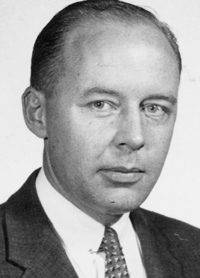Bryce Harlow
Bryce Harlow | |
|---|---|
 | |
| Counselor to the President | |
| In office November 5, 1969 – December 9, 1970 Served with Daniel Patrick Moynihan | |
| President | Richard Nixon |
| Preceded by | Arthur F. Burns |
| Succeeded by | Donald Rumsfeld |
| White House Director of Legislative Affairs | |
| In office January 20, 1969 – November 5, 1969 | |
| President | Richard Nixon |
| Preceded by | Barefoot Sanders |
| Succeeded by | Bill Timmons |
| In office October 7, 1958 – January 20, 1961 | |
| President | Dwight D. Eisenhower |
| Preceded by | Wilton Persons |
| Succeeded by | Larry O'Brien |
| Personal details | |
| Born | August 11, 1916 Oklahoma City, Oklahoma, U.S. |
| Died | February 17, 1987 (aged 70) Arlington, Virginia, U.S. |
| Political party | Democratic (Before 1950) Republican (1950–1987) |
| Education | University of Oklahoma (BA) University of Texas, Austin |
Bryce Nathaniel Harlow (August 11, 1916 – February 18, 1987) was an American congressional staff member, army officer, advisor to U.S. presidents, and corporate lobbyist.
Early life
He was born in 1916 in
Military career
In 1940, he joined the army reserve, and in July 1941, he was placed on active duty as an officer in the public information office of Army Chief of Staff Gen.
Corporate career
After the war, Harlow returned to Oklahoma City twice to serve as vice president of Harlow Publishing Company in 1946–47 and 1951–52, but both times, he was recruited back to positions in Washington. In 1947, he joined the staff of the House Armed Services Committee, and in 1948, he became the head of the staff. In 1950, he became disenchanted with the Democratic Party and switched his registration to Republican.[2]
Government career
In 1953, newly elected President Dwight D. Eisenhower established a congressional liaison office in the White House and appointed Wilton B. Persons as its head. Persons suggested Bryce Harlow join the staff, and Eisenhower was enthusiastic. Harlow resisted at first, wanting to stay in Oklahoma, but after a personal call from the President, he decided to accept. He was soon writing speeches for the President and went on to hold a variety of titles in the White House through Eisenhower's two terms.[3]
Harlow also wrote campaign speeches for
Harlow later served as an informal advisor to Presidents Gerald Ford and Ronald Reagan.[5]
Honors
Harlow received many honors. In 1960, he received the Minuteman Award, the highest honor of the
Bryce Harlow Foundation
In 1982, the Bryce Harlow Foundation was established. The Foundation has awarded the Bryce Harlow Award to an individual who has worked to advance business-government relations and "whose integrity, dedication and professionalism echo the work and life of the late Bryce Harlow." Recent recipients of the award have included Senators

The Bryce Harlow Foundation also promotes integrity in professional advocacy through workshops and advocacy forums at educational institutions in Washington, D.C. The foundation selects approximately twenty part-time Washington, D.C. area graduate students each year to receive the Bryce Harlow Fellowship. The current president of the Bryce Harlow Foundation is Barbara Faculjak.
Notes
- ^ Burke and Thompson, pp. 27-32.
- ^ Burke and Thompson, pp. 37-43.
- ^ Burke and Thompson, pp. 49-139.
- ^ Mayer
- ^ Burke and Thompson, pp. 250-257, 265-267.
- ^ Burke and Thompson, p. 140.
- ^ "Bryce Harlow Award | Bryce Harlow Foundation". Archived from the original on 2014-02-26. Retrieved 2014-02-23.
References
- Burke, Bob and Ralph G. Thompson (2000). Bryce Harlow: Mr. Integrity, Oklahoma Heritage Association (ISBN 9781885596154)
- Mayer, Michael S. (2010). "Harlow, Bryce N." The Eisenhower Years, Presidential Profiles. American History Online. Facts On File, Inc. (accessed February 22, 2014)
External links
- Bryce Harlow Foundation
- Bryce N. Harlow Collection at the Carl Albert Center
- Papers of Bryce N. Harlow at the Dwight D. Eisenhower Presidential Library
- Encyclopedia of Oklahoma History and Culture - Harlow, Bryce
- Obituary, New York Times

